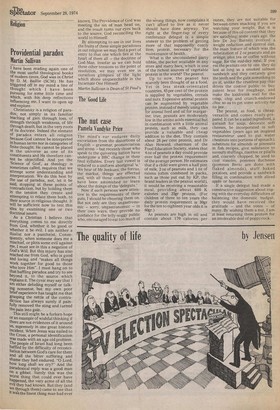Providential paradox
Martin Sullivan
I have been reading again one of the most useful theological books of modern times, God was in Christ by D. M. Baillie (SCM). He has triggered off in my mind a line of thought which I have been pursuing for some little time and Which, with his deep reflections influencing me, I want to open up and explore.
Christianity is a religion of paradox; not simply in its familiar teaching of gain through loss, of strength through weakness, of life through death, but in the very roots of its doctrine. Indeed the element of paradox enters all religion because God cannot be interpreted in human terms nor in categories of finite thought. He cannot be placed in the universe as one of its constituents and He therefore cannot be objectified. And yet the 'Science of God', as theology is sometimes called, requires that we attempt some understanding and interpretation. We do this best by the use of paradox, not, let it be said, stopping at these points of contradiction, but by holding them in the tension they create and attempting to relate them both, to their source in religious thought. It Will be sufficient now to test this idea by examining one or two doctrinal issues.
As a Christian I believe that everything comes to me directly from God, whether it be good or Whether it be evil. I am neither a dualist nor a pantheist. Consequently, when someone does me a mischief, or plots some evil against Me, I must see in this a negation of God's Will. But this injury has also reached me from God, who is good and loving and "makes all things work together for good to those Who love Him". I must hang on to that baffling paradox and try to see beyond it, to the source which explains it. The cynic may say that I am either deluding myself or talking nonsense, but my own poor brief experience has taught me that grasping the nettle of the contradiction has always surely if painfully removed the sting and turned the pain into gain.
This still might be a forlorn hope or an example of wishful thinking if there are not evidences of it around US, supremely in one great historic incident. When Jesus was nailed to the Cross, a personal identification was made with an age old problem. The people of Israel had long been baffled by the difficulty of reconciliation between God's care for them and all the bitter suffering and Shame they had endured. "0 Lord, how long shall we cry?" And the Paradoxical reply was a good man Ofl a gibbet. Surely this was the Worst thing that could ever have haPPened, the very acme of all the evil they had known. But they (and We through them) came to see that it WA the finest thing man had ever
known. The Providence of God was meeting the sin of 'man head on, and the result turns our eyes back to the source, God reconciling the world to Himself.
By attempting to see in our lives the fruits of these simple paradoxes in our religion we may find a port of entry to that one which lies at the heart of them all the doctrine of God-Man. Insofar as we can hold these other tensions to the point of resolution, we may even see in ourselves glimpses of the light which shone unquenchable in the Incarnate One Himself.
Martin Sullivan is Dean of St Paul's


































 Previous page
Previous page